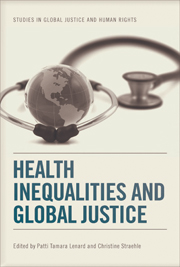Book contents
- Frontmatter
- Contents
- Acknowledgements
- Notes on the Contributors
- Introduction: Health Inequality and Global Redistributive Justice
- Part 1 A Right to Equal Health?
- 1 Is there a Human Right to Health?
- 2 What's Wrong with Global Health Inequalities?
- 3 Ecological Subjects, ‘Ethical Place-making’ and Global Health Equity
- 4 Health Inequalities, Capabilities and Global Justice
- Part 2 Who is Responsible for Remedying Global Health Inequality?
- Part 3 Measuring Health and Health Outcomes
- Part 4 Borders and Health
- Bibliography
- Index
3 - Ecological Subjects, ‘Ethical Place-making’ and Global Health Equity
from Part 1 - A Right to Equal Health?
Published online by Cambridge University Press: 05 August 2013
- Frontmatter
- Contents
- Acknowledgements
- Notes on the Contributors
- Introduction: Health Inequality and Global Redistributive Justice
- Part 1 A Right to Equal Health?
- 1 Is there a Human Right to Health?
- 2 What's Wrong with Global Health Inequalities?
- 3 Ecological Subjects, ‘Ethical Place-making’ and Global Health Equity
- 4 Health Inequalities, Capabilities and Global Justice
- Part 2 Who is Responsible for Remedying Global Health Inequality?
- Part 3 Measuring Health and Health Outcomes
- Part 4 Borders and Health
- Bibliography
- Index
Summary
In this essay I begin by asking what research on societal determinants of health suggests for the specific ideals we should aspire toward in addressing global health inequities. I consider a set of theories of justice that seems best-suited to attend to societal determinants of health and find them wanting given an impoverished conception of subjects. I suggest, first, a slight shift in focus away from individual selves and propose an ethic of ‘implacement’ or ‘place-making’ for persons (re) conceived as ecological subjects. In making this argument I draw on a not-so-novel epistemological framework, ecological thinking, and demonstrate its value for understanding and responding to global health inequities. Ecological thinking, indeed, suggests new ideas about the ethical norms that should guide work for global health equity. At the same time, it helps to shine light on the sources of responsibility. I will also argue that the grounding of responsibility for global health equity can be found not merely in shared humanity, compassion and participation in the processes that generate injustice, but also in our nature as ecological subjects, that is, interdependent beings who are in a profound sense constitutive of one another. The social connections between us – ‘across distance’ as they are often framed – are even tighter than most theorising about global justice acknowledges.
- Type
- Chapter
- Information
- Health Inequalities and Global Justice , pp. 52 - 64Publisher: Edinburgh University PressPrint publication year: 2012

